#theologian Thursday
Text
Hot take but Christianity is a powerful corrective when you have come to the conclusion that nihilism is too fucking optimistic.
Like no sorry, Pollyanna, if my hopelessness led me to acts of terrorism or other violence it would only worsen the things I’m hopeless about, and make me even more fucking miserable. Following the rules is worthless and meaningless and vile, but breaking them is even worse. Thus does conscience make cowards of us all, the native hue of resolution sicklied over with the pale cast of thought.
And then you turn to Him and you say “What about you? Have you ever suffered?” and he answers “Can you drink of the cup that I drink of?” and shows you the wounds in his hands.
5 notes
·
View notes
Note
what are your thoughts about what's going to happen on the 11th and 12th? I'm south african and although we've got a strong free Palestine and anti zionist community, as well as being the country to get Israhell to the ICJ, the pro zionist/Israel is very strong and very big. my fear is that if my country can be so against Palestine (and this is mainly because Israhell has sold this idea that Israel=the Holy land and Christianity is very strong here in SA) how is it going to be in other countries. Islamophobia is so much worse in western countries and I'm genuinely fearing for the outcome because the reality is whether Israhell is condemned or not, there's going to be outrage.
I'm not educated enough to even understand the implications of the ICJ, but I do pray that it goes in my country's favour, thereby going in Palestine's favour. I don't know if this is ignorant on my part, so do forgive me if this statement is tone deaf, but I remember reading something regarding the Syrian Civil War: that the healing process is painful but the result is worth it.
I sincerely believe that Israhell will not win and that Palestine will be free. My country is far from perfect, but we achieved democracy and ended our own Apartheid. Despite what many believe or think, I refuse to condemn Hamas because although I myself believed them to be in the wrong and thought of them as terrorists, the ANC were considered terrorists and Nelson Mandela was only removed from the CIAs terrorist list when Obama came into office. So it became clear to me that any act of resistance will always be considered an act of terror in the eyes of the oppressor, and we in Cape Town recognize this and we pray for Palestine's liberation.
I was born 11 years after Apartheid and grew up free, so I know that I will never be able to understand your pain, but I pray to Allah that this current generation will give birth to Palestinians who are like me and never have to experience oppression.
Allah will save this Ummah, I believe in it, and a powerful statement that was made by Alan Busack, a politician and theologian in my country, when he and Naledi Pandor, my country's Minister of International Relations, announced that the charge had been lodged with the UN was that "Palestine is already free." and i realized while listening to his speech that Palestinians are the bravest souls. Your children are braver than I could ever be and your faith is stronger than steel.
Regardless of the results of this case, we in South Africa will not give up on Palestine, we even have this new found tradition of fasting on Thursdays for Palestinians, and altho the Zionist movement is strong here and people are even being kicked out of public places for wearing the colours of the Palestinian flag, us supporters will take it in our stride.
May Allah bless you and free Palestine In Sha Allah Ameen ❤️
for the most part, what i hear and believe from my community is that the icj isn't actually gonna do anything or dismantle israel. but it WILL show the world the atrocities they've committed, and more and more people will be exposed to what has been happening, and therefore the intifada will become stronger. even if the icj doesn't do much (inshallah it will), it will still expose israel for what it is and will help change peoples minds over what is happening. that is the biggest thing we believe we will get out of from this whole situation.
islamophobia through christian zionism isn't new, nor is it something we don't know how to deal with. i don't really think you personally should be worrying about that, though we do appreciate the concern. people are waking up and more and more people are joining the intifada and not just protesting and supporting us but they're actually learning about palestine and it's history and culture and people and it's allowing people to learn about how palestine is the holy land and how we must protect it, etc etc. the world is turning to our side and taking apart christian zionism and proving it wrong, so while yes christian zionism is dangerous, it's easily dismissible and taken apart, and we are prepared to deal with that.
we are grateful for south africa helping us and inshallah palestine will be free soon. i hope the next generation of our children will never have to face hardship like this ever again. may allah accept all martyrs and send them to heaven ya rab. thank you for your kind message, it means a lot 🫶
#im sorry i wish i could answer a little more thoroughly but im rather exhausted and these are just my true thoughts#palestine#free palestine
48 notes
·
View notes
Text
Lore Thursday — Goblin



A heavily armed and armored battlesuit built both by and for Unggoy, the Pnap-pattern Goblin was created in the likeness of the Forerunners' "pre-ascension" form, according to Unggoy theologian Ang'napnap the Enlightened.
#LoreThursday#lore thursday#halopedia#gruntgoblin#grunt goblin#pnap-pattern#unggoy#halo5guardians#halo 5#halo5#halo 5 guardians#halo wiki#halowiki#halo#created#covenant
21 notes
·
View notes
Text
“Spy” Wednesday in Holy Week, The Office of Tenebrae (Darkness from the Latin) The Funeral Service of the Lord, St John Damascene and the Saints for 27 March
“Spy” Wednesday in Holy Week – FAST
The Office of Tenebrae (Darkness from the Latin)The Funeral Service of the Lordon Spy Wednesday, Maundy Thursday and Good FridayHERE:https://anastpaul.com/2023/04/05/the-office-of-tenebrae-darkness/
St John Damascene (675-749) Confessor, Father and Doctor of the Church, Priest, Monk, Theologian, Writer, Defender of Iconography, Poet, a Polymath whose fields…

View On WordPress
#blpellegrinooffalerone#saints27march#spywednesday#staugustaoftreviso#STJOHNDAMASCENE#stjohnof lycopolis#stjohnoflycopolis#strupertofsalzburg#theofficeoftenebrae
8 notes
·
View notes
Text

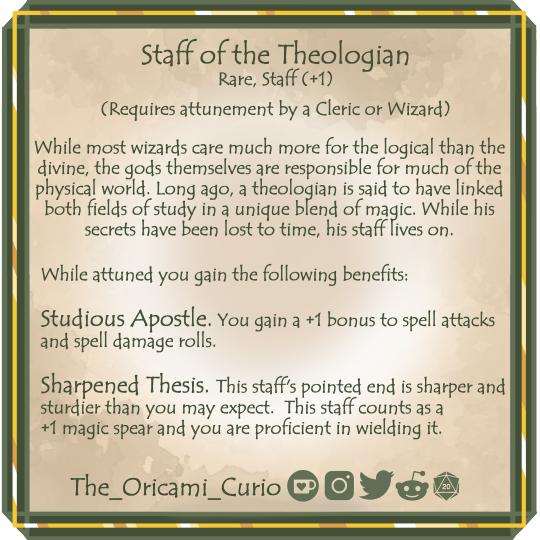
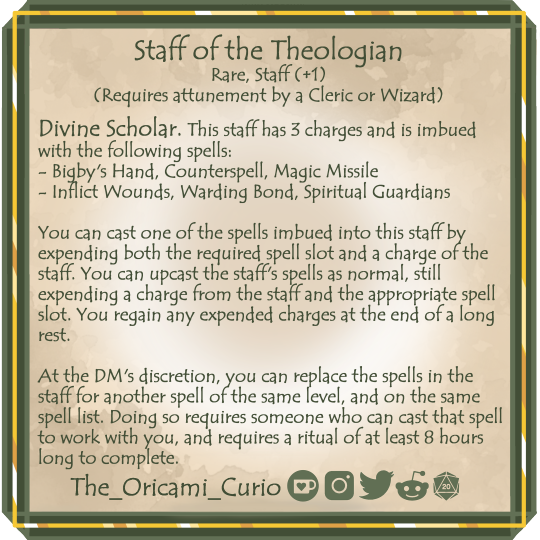
Staff of the Theologian
Rare, Staff (+1)
(Requires attunement by a Cleric or Wizard)
While most wizards care much more for the logical than the divine, the gods themselves are responsible for much of the physical world. Long ago, a theologian is said to have linked both fields of study in a unique blend of magic. While his secrets have been lost to time, his staff lives on.
While attuned you gain the following benefits:
Studious Apostle. You gain a +1 bonus to spell attacks and spell damage rolls.
Sharpened Thesis. This staff's pointed end is sharper and sturdier than you might expect. This staff counts as a +1 magic spear and you are proficient in wielding it.
Divine Scholar. This staff has 3 charges.
This staff is imbued with the following spells:
Bigby's Hand, Counterspell, Magic Missile
Inflict Wounds, Warding Bond, Spiritual Guardians
You can cast one of the spells imbued into this staff by expending both the required spell slot and a charge of the staff. You can upcast the staff's spells as normal, still expending a charge from the staff and the appropriate spell slot. You regain any expended charges at the end of a long rest.
At the DM's discretion, you can replace the spells in the staff for another spell of the same level, and on the same spell list. Doing so requires someone who can cast that spell to work with you, and requires a ritual of at least 8 hours long to complete.
-
-
Ko-fi - Early access weekly items, Transparent PNG files and alternate forms, map packs, small settings and more!
Discord - Talk with artists, science nerds and TTRPG lovers alike!
Twitch - Talk about your character's, campaigns, while you can see me draw next week's homebrew! Every Thursday @ 9pm EST.
Commissions - See my commission prices and DM me for more information or a quote!
#dnd 5e art#dnd 5e homebrew#dnd homebrew#dnd5e#dnd#dungeonmaster#d&d 5e homebrew#d&d 5th edition#d&d 5e#d&d#digital art#digital artist#5e homebrew#homebrew#magic item#magic items#art#artists on tumblr#fantasy#fantasy artist#staff#wizard#cleric
62 notes
·
View notes
Text
Saints&Reading: Thursday, March 7, 2024
february 23_march 7
HIEROMARTYR POLYCARP, BISHOP OF SMYRNA (167)
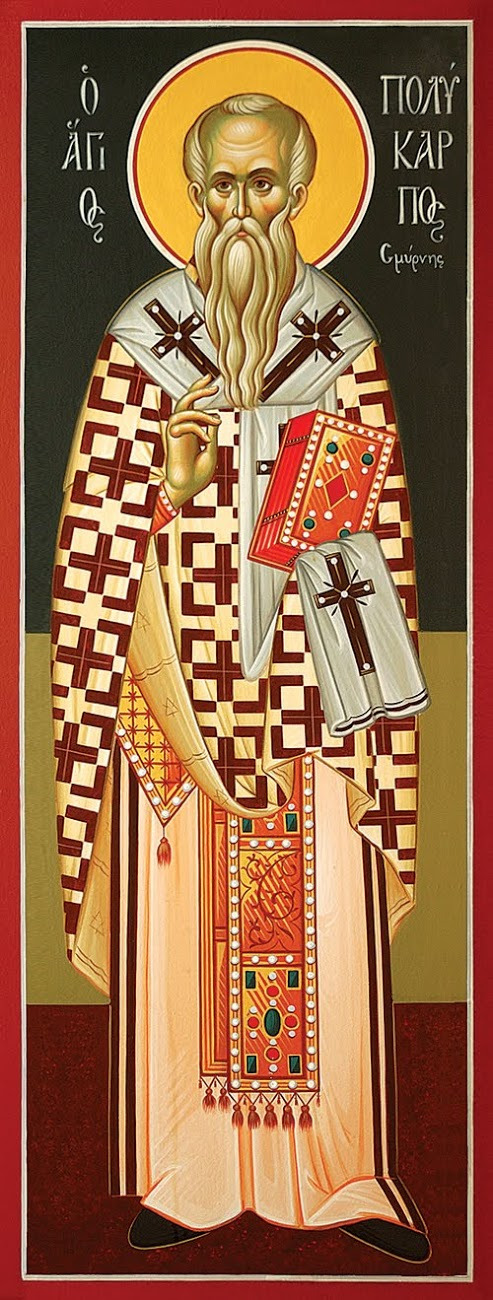
Saint Polycarp, Bishop of Smyrna, who was “fruitful in every good work” (Col. 1:10), was born in the first century, and lived in Smyrna in Asia Minor. He was orphaned at an early age, but at the direction of an angel, he was raised by the pious widow Kallista. After the death of his adoptive mother, Polycarp gave away his possessions and began to lead a chaste life, caring for the sick and the infirm. He was very fond of and close to Saint Bucolus, Bishop of Smyrna (February 6). He ordained Polycarp as deacon, entrusting to him to preach the Word of God in church. He also ordained him to the holy priesthood.
The holy Apostle John the Theologian was still alive at this time. Saint Polycarp was especially close to Saint John, and sometimes accompanied him on his apostolic journeys.
Shortly before his death, Saint Bucolus expressed his wish that Polycarp be made Bishop of Smyrna. When Saint Polycarp was consecrated as a bishop, the Lord Jesus Christ appeared to him. Saint Polycarp guided his flock with apostolic zeal, and he was also greatly loved by the clergy. Saint Ignatius the God-Bearer of Antioch (December 20) also had a high regard for him. Setting out for Rome where execution awaited him, he wrote to Saint Polycarp, “This age is in need of you if it is to reach God, just as pilots need winds, and as a storm-tossed sailor needs a port.”
The emperor Marcus Aurelius (161-180) came to the Roman throne and started up a most fierce persecution against Christians. The pagans demanded that the judge search for Saint Polycarp, “the father of all the Christians” and “the seducer of all Asia.”
During this time Saint Polycarp, at the persistent urging of his flock, stayed in a small village not far from Smyrna. When the soldiers came for him, he went out to them and invited them in to eat. He asked for time to pray, in order to prepare himself for martyrdom. His suffering and death are recorded in the “Epistle of the Christians of the Church of Smyrna to the Other Churches,” one of the most ancient memorials of Christian literature.
Having been brought to trial, Saint Polycarp firmly confessed his faith in Christ, and was condemned to be burned alive. The executioners wanted to nail him to a post, but he declared that God would give him the strength to endure the flames, so they could merely tie him with ropes. The flames encircled the saint but did not touch him, coming together over his head in the shape of a vault. Seeing that the fire did him no harm, the pagans stabbed him with a dagger. So much blood flowed from this wound that it extinguished the flames. The body of the hieromartyr Polycarp was then cremated. The Christians of Smyrna reverently gathered up what remained of his holy relics, and each year they celebrated the day of his martyrdom.
A story has been preserved about Saint Polycarp by his disciple, Saint Irenaeus of Lyons, which Eusebius cites in his ECCLESIASTICAL HISTORY (V, 20):
“I was still very young when I saw you in Asia Minor at Polycarp’s,” writes Saint Irenaeus to his friend Florinus, “but I would still be able to point out the place where Blessed Polycarp sat and conversed, and be able to depict his walk, his mannerisms in life, his outward appearance, his speaking to people, his companionable wandering with John, and how he himself related, together with other eyewitnesses of the Lord, those things that he remembered from the words of others. He also told what he heard from them about the Lord, His teachings and miracles....
“Through the mercy of God to me, I then already listened attentively to Polycarp and wrote down his words, not on tablets, but in the depths of my heart. Therefore, I am able to bear witness before God, that if this blessed and apostolic Elder heard something similar to your fallacy, he would immediately stop up his ears and express his indignation with his usual phrase: ‘Good God! That Thou hast permitted me to be alive at such a time!’”
During his life the holy bishop wrote several Epistles to the flock and letters to various individuals. The only one that has survived to the present day is his Epistle to the Philippians which, Saint Jerome testifies, was read in the churches of Asia Minor at divine services. It was written by the saint in response to the request of the Philippians to send them some letters of the hieromartyr Ignatius (December 20) which Saint Polycarp had in his possession.
The composer H.I.F. Bibier (1644-1704) has written a Sonata “Scti Polycarpi” for eight trumpets in honor of the holy martyr.
THE MONK ALEXANDER, FOUNDER OF THE "UNCEASING VIGILANCE" MONASTERY (430)

Saint Alexander, Founder of the Monastery of the “Unsleeping Ones,” was born in Asia and received his education at Constantinople. He spent some time in military service but, sensing a call to other service, he left the world and accepted monastic tonsure in one of the Syrian wilderness monasteries near Antioch, under the guidance of igumen Elias. He spent four years in strict obedience and monastic effort, after which he received from the igumen blessing to dwell in the desert. Going into the wilderness, the monk took with him nothing from the monastery, except the Gospel. The monk then struggled in the desert for seven years. Afterwards, the Lord summoned him to preach to pagans.
The saint converted to Christ the local city ruler named Rabul, who afterwards was consecrated a bishop and for 30 years occupied the bishop’s cathedra of the city of Edessa. Together with Rabul all the local inhabitants accepted Baptism, and before receiving the sacrament they burned their idols in the city square. Having confirmed the newly-converted in the Faith, Saint Alexander again went into the desert, where by chance he came upon a cave of robbers. Unafraid of the danger that threatened him, he preached the Gospel to them and urged them to repent. In fact, all the robbers did repent. They accepted holy Baptism, and they transformed their cave into a monastery, where they dwelt in prayer and penitence. Saint Alexander appointed an igumen for them, gave them a monastic rule, and he himself resettled still farther in the desert.
For several years he lived in complete solitude. But even there lovers of solitude began to flock to the monk. A monastery emerged, numbering 400 monks. Desiring at this monastery to establish uninterrupted praise to the Lord, the monk prayed for three years, that the Creator would reveal to him His will, and having then received the revelation, he initiated at the monastery the following order: all the monks were divided into 24 watches of prayer. Changing shifts each hour, day and night they sang in two choirs the Psalms of David, interrupting this only for the times of the divine services. The monastery received the name “ the Unsleeping Ones,” because the monks sang praise to God throughout the day and night.
Saint Alexander guided the monastery on the Euphrates for twelve years. Afterwards, leaving one of his disciples, the experienced Elder Trophimus as its igumen, he set out with some chosen brethren through the cities bordering on Persia, preaching the Gospel among the pagans. After this missionary journeying, Saint Alexander lived with his monks for a certain while at Antioch. There he built a church for the city-dwellers, and a home for the sick and homeless with the money that charitable Antiochians put at his disposal. However, through the intrigues of the jealous, Saint Alexander was compelled to move to Constantinople.
Here he founded a new monastery, in which he also initiated a monastic rule of “unceasing vigilance.” Saint Alexander and his monks suffered at Constantinople under the Nestorian heretics, enduring beatings and imprisonment. After this, when the storm of unrest abated, Saint Alexander spent the last days of his life at the Constantinople monastery he founded. He died in extreme old age in about the year 430, after 50 years of incessant monastic effort. He is also commemorated on February 23.
Source: Orthodox Church in America_OCA
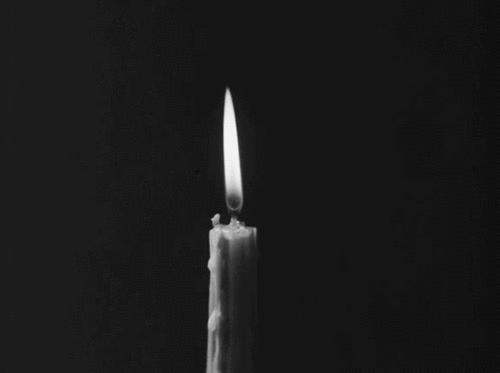

1 JOHN 4:20-5:21
20 If someone says, "I love God," and hates his brother, he is a liar; for he who does not love his brother whom he has seen, how can he love God whom he has not seen? 21 And this commandment we have from Him: that he who loves God must love his brother also.
1 Whoever believes that Jesus is the Christ is born of God, and everyone who loves Him who begot also loves him who is begotten of Him. 2 By this we know that we love the children of God, when we love God and keep His commandments. 3 For this is the love of God, that we keep His commandments. And His commandments are not burdensome. 4 For whatever is born of God overcomes the world. And this is the victory that has overcome the world-our faith. 5 Who is he who overcomes the world, but he who believes that Jesus is the Son of God? 6 This is He who came by water and blood-Jesus Christ; not only by water, but by water and blood. And it is the Spirit who bears witness, because the Spirit is truth. 7 For there are three that bear witness in heaven: the Father, the Word, and the Holy Spirit; and these three are one. 8 And there are three that bear witness on earth: the Spirit, the water, and the blood; and these three agree as one. 9 If we receive the witness of men, the witness of God is greater; for this is the witness of God which He has testified of His Son. 10 He who believes in the Son of God has the witness in himself; he who does not believe God has made Him a liar, because he has not believed the testimony that God has given of His Son. 11 And this is the testimony: that God has given us eternal life, and this life is in His Son. 12 He who has the Son has life; he who does not have the Son of God does not have life. 13 These things I have written to you who believe in the name of the Son of God, that you may know that you have eternal life, and that you may continue to believe in the name of the Son of God. 14 Now this is the confidence that we have in Him, that if we ask anything according to His will, He hears us. 15 And if we know that He hears us, whatever we ask, we know that we have the petitions that we have asked of Him. 16 If anyone sees his brother sinning a sin which does not lead to death, he will ask, and He will give him life for those who commit sin not leading to death. There is sin leading to death. I do not say that he should pray about that. 17 All unrighteousness is sin, and there is sin not leading to death. 18 We know that whoever is born of God does not sin; but he who has been born of God keeps himself, and the wicked one does not touch him. 19 We know that we are of God, and the whole world lies under the sway of the wicked one. 20 And we know that the Son of God has come and has given us an understanding, that we may know Him who is true; and we are in Him who is true, in His Son Jesus Christ. This is the true God and eternal life. 21 Little children, keep yourselves from idols. Amen.
MARK 15:1-15
1 Immediately, in the morning, the chief priests held a consultation with the elders and scribes and the whole council; and they bound Jesus, led Him away, and delivered Him to Pilate. 2 Then Pilate asked Him, "Are You the King of the Jews?" He answered and said to him, "It is as you say." 3 And the chief priests accused Him of many things, but He answered nothing. 4 Then Pilate asked Him again, saying, "Do You answer nothing? See how many things they testify against You!" 5 But Jesus still answered nothing, so that Pilate marveled. 6 Now at the feast he was accustomed to releasing one prisoner to them, whomever they requested. 7 And there was one named Barabbas, who was chained with his fellow rebels; they had committed murder in the rebellion. 8 Then the multitude, crying aloud, began to ask him to do just as he had always done for them. 9 But Pilate answered them, saying, "Do you want me to release to you the King of the Jews?" 10 For he knew that the chief priests had handed Him over because of envy. 11 But the chief priests stirred up the crowd, so that he should rather release Barabbas to them. 12
Pilate answered and said to them again, "What then do you want me to do with Him whom you call the King of the Jews?" 13 So they cried out again, "Crucify Him!" 14 Then Pilate said to them, "Why, what evil has He done?" But they cried out all the more, "Crucify Him!" 15 So Pilate, wanting to gratify the crowd, released Barabbas to them; and he delivered Jesus, after he had scourged Him, to be crucified.
#orthodoxy#orthodoxchristianity#easternorthodoxchurch#originofchristianity#spirituality#holyscriptures#gospel#wisdom#bible#saints
2 notes
·
View notes
Photo

[id: an image labeled “the problem of evil: why does a good God let bad things happen?” A Popsicle stick triangle with duct tape shoddily holding it together has text in the center reading “pick 2,” the options being the three sides labeled “God is good & just,” “God is all powerful,” and “evil & suffering exist.” Text at the bottom of the image reads, “Let’s talk about it: Thursday May 5, 2022, 1pm EST live at Blessed Are the Binary Breakers on YouTube” / end ID]
Most, if not all, religions seek to answer the question of why suffering exists.
Let’s talk about it — this Thursday, May 5 2022, at 1pm EST at youtube.com/blessedarethebinarybreakers.
Without offering any definitive answers, I’ll take you through the responses of various biblical authors and theologians across the ages.
I’ll be tackling this topic from my own Christian context, but I welcome persons of any (or no) faith to join — the more perspectives present, the richer the discussion!
Some other things of note:
I’ll aim for this discussion to go about 1.5 hours. Coming late or leaving early is totally welcome.
Accessibility: I’ll have auto-captions on for the live-stream, and I’ll do my best to describe any images that I show. Let me know if there’s anything else I can do to make this event more accessible for you!
Participation: The nature of YouTube live is that I will be on video with sound and visuals (and I’ll be sharing a PowerPoint); while attendees are invited to participate with comments, or just listen in quietly. I will make lots of space for questions, ideas, and reactions!
Bigotry won’t be tolerated. Mistakes in wording happen of course, so don’t be afraid of making honest mistakes — but if it becomes clear a person is being intentionally bigoted in any way, including against non-Christians, I’ll kick them off.
#if you wanna tell me you plan on coming that's a big help to me!#also feel free to ask questions or share concerns#theodicy#bible study#youtube#youtube live#the problem of evil#suffering#log#spring 2022
133 notes
·
View notes
Text
Today in Christian History
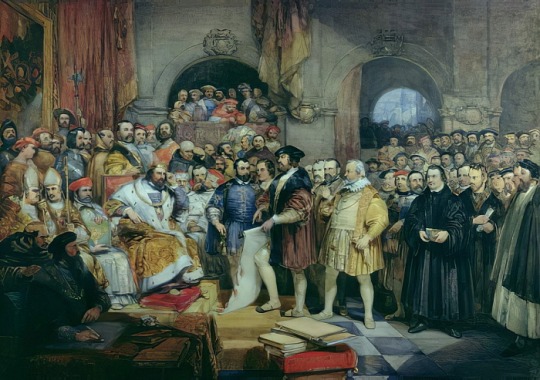
Today is Thursday, April 20th, the 110th day of 2023. There are 255 days left in the year.
Today’s Highlight in History:
1479: Death of Alexander who founded the Orthodox monastery of Oshevensk, experienced miracles, and was a notable spiritual counselor.
1529: At the Second Diet of Speyer, the term “Protestant” is first applied to participants of the Reformation. The term was taken from the Protestatio, a statement by the reformers challenging the imperial stance on religion.
1558: Death of Johannes Bugenhagen, a leading Lutheran reformer, a professor at the University of Wittenberg, and the pastor of the city church there. Bugenhagen had helped Luther with his German Bible translation as well as translating the Bible into Low German himself.
1653: Cromwell dissolves the Rump Parliament, so-called because it consisted of only a few representatives who still remained. Cromwell lectures them on their vices and their uselessness, saying he is doing this at God’s command: “Depart, I say, and let us have done with you. Go!”
1676: Death of Baptist minister John Clarke, a founding father of Rhode Island, and the agent who obtained the colony’s charter from King Charles II in 1663.
1898: C.H. Spurgeon’s London tabernacle burns down. Efforts to rebuild it commence at once.
1962: Theologian Karl Barth is featured on the cover of Time magazine.
1988: Wilson Rajil Sabiya, a Lutheran theologian, writes a letter to General Ibrahim Babangida, President and Commander-in-chief of the Armed Forces of the Federal Republic of Nigeria, alerting him to Muslim efforts to make Nigeria an Islamic country by infiltrating the police force.
2001: A Peruvian Air Force aircraft shoots down a private airplane carrying missionaries, killing Veronica Bowers and her infant daughter, Charity.
#Today in Christian History#April 20#Cromwell dissolves the Rump Parliament#Spurgeon’s London tabernacle burns down#the Second Diet of Speyer#Death of Baptist minister John Clarke#Death of Johannes Bugenhagen
7 notes
·
View notes
Text
How Benedict’s death could reshape the Catholic Church
VATICAN CITY — Pope Emeritus Benedict XVI’s death Saturday is an epochal loss for a church that was defined first by his resolute conservatism and later by his radical decision to abdicate power.
The Vatican said that Benedict died at 9:34 a.m. local time and that his body would be placed in St. Peter’s Basilica starting Jan. 2 for a salute “from the faithful.” Pope Francis will preside over his funeral, which will take place Thursday, the Vatican said. Afterward, Benedict’s body will be interred in the grottoes of St. Peter’s Basilica.
Benedict’s decline, after a decade of retirement, had been relatively swift. Francis had put the Catholic world on alert Wednesday, saying his predecessor was “very sick,” and asked for prayers.
“We are moved as we remember him as such a noble person, so kind, and we feel such gratitude in our hearts,” Francis said Saturday evening, in a prayer service at St. Peter’s.
The 95-year-old’s death is likely to reshape the church on several fronts, given that Benedict — who lived longer than anybody who had ever been pope — spanned so many eras, opined on so many subjects and influenced so many of the conservative faithful.
Even in retirement, he had been embraced by traditionalists as the embodiment of their ideals. His death leaves that movement — which at times is vocal and oppositional to Francis — without a figure of comparable clout. His death also, in the short-term, sets the church on a more conventional path, ending a polarizing 10-year period in which the Vatican had two figures wearing white, a pope and an ex-pope. That Francis as a sitting pope will preside over his predecessor’s funeral is another church novelty.
For all Benedict did to shape the church, though, his death does not cause the extraordinary tremors that would have resulted had he remained pontiff. In the coming days, there will be no conclave, no intrigue, no white smoke. Instead, the church will simply have the chance to reflect on an often-controversial figure who girded the institution against the forces of modernization and who presided over some of the rockiest years of the clerical abuse crisis.
It also must decide which ceremonial aspects to afford his funeral and burial, a delicate set of questions that will set precedent for handling the death of a retired pope. Already, one difference emerged, in that the bells at St. Peter were not specifically tolled for Benedict’s death, something that would only happen for the death of a siting pope, a Vatican spokesman said.
Sandwiched between two popes more skilled in outreach to non-Catholics, Benedict was seen as a bookish purist. He first gained prestige as a theologian and academic. He later wrote comprehensive volumes on Jesus. As cardinal, he served as one of John Paul II’s most trusted lieutenants. As pope, he vouched for an economic system that works for the “common good.”
“Christians will be drawing on his theological legacy for centuries,” said Michela Carrozzino, a Rome-based nun who had met Benedict in his retirement.
Tributes to Benedict quickly came pouring in, befitting a figure who was ordained in 1951, made cardinal by Paul VI in 1977 and was seen as a Vatican power broker well before becoming pope. Italian prime Minister Giorgia Meloni called him a “giant of faith and reason.” French President Emmanuel Macron said he worked “with soul and intelligence for a more fraternal world.”
But he was far from universally beloved, including in his home country of Germany, where the church in recent years — battered by scandal — had sought to modernize, reconsidering stances on homosexuality and celibacy, in an approach antithetical to Benedict’s. Wir Sind Kirche, a movement advocating for church reforms, said in a statement about Benedict’s death that he had brought the church to a “theological standstill” with a “climate of fear.”
The last time a pope died — John Paul II, in 2005 — there was a spontaneous outpouring of emotion in Rome, with Catholics flooding into St. Peter’s Square, many weeping. But in the hours after Benedict’s death, the square instead looked as it mostly does: with tourists taking selfies and waiting in lines to enter the basilica.
Across Rome Saturday, the city prepared mostly as normal for New Year’s Eve celebrations on a day with temperatures in the mid-60s. Children shuttled on and off a holiday carousel in Piazza Navona. Couples sipped drinks. The city said it that, after consulting with the Vatican, it would go ahead with an evening concert and other festivities on New Year’s Day, though in some instances there would be a minute of silence.
That difference in reaction, compared with 2005, speaks partly to the fact that Benedict had long been out of the public eye. It also speaks to the damage incurred by the Catholic Church over the past two decades as a result of the sexual abuse crisis and the Vatican’s inadequate response — an upheaval that ensnared Benedict personally.
This past year, a German investigation accused him of wrongdoing in several cases during his time leading the diocese of Munich, from 1977 until 1982. Before becoming pope, he also headed the powerful Vatican body whose purview included abuse cases.
“In our view, Pope Benedict XVI is taking decades of the church’s darkest secrets to his grave with him,” the Survivors Network of Those Abused by Priests said in a statement.
Church historians say the most significant ramification for Catholicism’s future could stem from Benedict’s decision in 2013 to abdicate power, becoming the first pontiff in 600 years to do so. Francis has several times indicated that Benedict created a precedent for future pontiffs, and he said this month that he’d already written a resignation letter — in case of dire health problems.
Francis is 86 and slowed by knee pain but keeps a busy schedule, and there is no indication he might step down soon. But Benedict’s death makes it easier for Francis to consider abdication in the future. One retired pope is less tricky than two.
Benedict’s abdication ultimately looked prescient, given the CEO-like demands of the job and Benedict’s frailty. For years, he had been moving with a walker, barely speaking above a whisper.
Still, the details of how Benedict conducted himself as a retiree proved problematic for the church. He elected not to revert to his given name, Joseph Ratzinger. He remained in the Vatican rather than returning to Germany. He continued dressing in papal white. Despite clearly asserting that Francis was the lone authority figure, he was embraced by conservatives as an alternative power, particularly as Francis sought to modernize the church.
“You can’t have a former pope walking around wearing white and then be surprised when some people say mistakenly that there are two popes,” said Christopher Bellitto, a papal historian at Kean University in New Jersey. “His [death] allows the church to have some serious conversations about how it would handle a future post-papacy. And the answer is, not this way.”
The greatest sense of mourning is likely to be felt among Catholic traditionalists, who saw Benedict as a protector of the eternal truths. He spoke about the dangers of secularism and societies that didn’t allow religious points of view. With pronouncements — and sometimes with purges of liberal theologians — he held the church line on social teachings. His appointment of conservative bishops helped push the American church toward the right. He also eased restrictions on the Latin Mass, an ancient rite adored by traditionalists — a move that was later reversed by Pope Francis.
Traditionalists sometimes have felt under siege in the Francis era. They chafe at his more ambiguous style in relation to hot-button topics, including homosexuality. Francis also has reseeded the College of Cardinals with more like-minded figures, increasing the odds — although hardly guaranteeing — that the next pope has a progressive bent. Traditionalists, in interviews, said their movement would not change substantially without Benedict, because for years he had been more of a symbol than an active participant.
“I think the traditionalists who feel isolated in the church right now should also remember that Pope Benedict stood for their unity with the whole church and not their isolation,” said Chad Pecknold, a professor of systematic theology at Catholic University in Washington. “So I think the traditionalists should not retreat into sadness at the death of Benedict.”
His nuanced, scholarly way of speaking had long fallen out of vogue with the most vocal members of the faith’s conservative wing, Vincent Miller, a professor of Catholic theology at the University of Dayton.
“He never uttered a soundbite in his life,” Miller said of Benedict. “He thought in paragraphs.”
For years, there had been intrigue about the relationship between Francis and Benedict, given their stylistic differences. Although their admirers were polarized, Francis routinely cited his predecessor and spoke warmly about him. Benedict said there was only “one pope” — Francis.
Saturday, leading a prayer service at a packed St. Peter’s Basilica — scheduled before Benedict’s death — Francis devoted only a short passage to the retired pope, moving on to other themes, such as the nature of kindness and the way to treat others.
After the service, Francis, in a wheelchair, was guided into St. Peter’s Square, where there were no signs of mourning. The Christmas tree was lit. The Swiss Guard band played festive music. Francis waved to adoring crowds.
19 notes
·
View notes
Photo

Today we celebrate our Holy Father Basil the Great, Bishop of Caesarea. Saint Basil was born during the reign of Emperor Constantine. While still unbaptized, he spent fifteen years in Athens, where he studied philosophy, rhetoric, astronomy and all the other secular sciences of that time. His colleagues there were Gregory the Theologian and Julian, later the apostate emperor. In his mature years he was baptized in the Jordan River along with Ebulios, his former teacher. He was Bishop of Caesarea in Cappadocia for almost ten years and completed his earthly life fifty years after his birth. He was a great defender of Orthodoxy, a great light of moral purity, a religious zealot, a great theological mind, and a great builder and pillar of the Church of God. Basil fully deserved the title “Great.” In liturgical services he is referred to as the “bee of the Church of Christ, which brings honey to the faithful and with its stinger pricks the heretics.” Numerous works of this Father of the Church are preserved; they include theological, apologetical, ascetical and canonical writings, as well as the Holy and Divine Liturgy named after him. This Divine Liturgy is celebrated ten times during the year: on the first of January, his feast day; on the eve of the Nativity of our Lord; on the eve of the Theophany of our Lord; on all Sundays of Great Lent except Palm Sunday; on Great and Holy Thursday; and on Great and Holy Saturday. St. Basil reposed peacefully on January 1, 379, and entered into the Kingdom of Christ. May he intercede for us always + Source: https://www.gometropolis.org/orthodox-faith/feast-days/saint-basil-the-great-archbishop-of-caesarea/ (at Kayseri) https://www.instagram.com/p/Cm2YjNUB8eT/?igshid=NGJjMDIxMWI=
9 notes
·
View notes
Text
3 notes
·
View notes
Text
The year ends with a big one.. Pope Benedict dead at 95
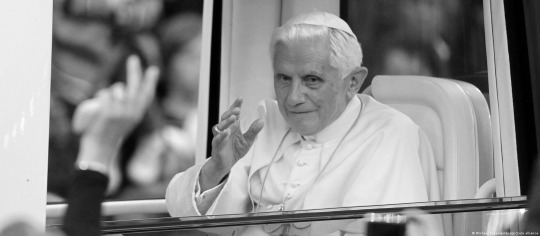
Pope Emeritus Benedict XVI, the shy German theologian who tried to reawaken Christianity in a secularized Europe but will forever be remembered as the first pontiff in 600 years to resign from the job, died Saturday. He was 95.
Pope Francis will celebrate his funeral Mass in St. Peter’s Square on Thursday, an unprecedented event in which a current pope will celebrate the funeral of a former one.
Benedict stunned the world on Feb. 11, 2013, when he announced, in his typical, soft-spoken Latin, that he no longer had the strength to run the 1.2 billion-strong Catholic Church that he had steered for eight years through scandal and indifference.
His dramatic decision paved the way for the conclave that elected Francis as his successor. The two popes then lived side-by-side in the Vatican gardens, an unprecedented arrangement that set the stage for future “popes emeritus” to do the same.
Funeral plans have already been set for the former Pope..
2 notes
·
View notes
Text
1 JOHN S.O.A.P. ~ CHAPTER 2
Thursday, 4/4/24
SCRIPTURE:
My little children, I am writing you these things so that you may not sin.
But if anyone does sin, we have an advocate with the Father — Jesus Christ the righteous one.
~ 1 John 2:1
OBSERVATION:
Is John giving some "wiggle room" here? Again, I'm no theologian...
"...so that I may not sin..." - not a thunderous command telling me that "I shall not sin..."
More like, "that I may not sin... though I may find I do sin from time to time..."?
Not giving permission, mind you...
...but acknowledging I'm human and just may - and will, despite my best efforts...
"But IF anyone does sin..."?
Fortunately for me, it's "whenever" I sin...
I have an advocate - THE Advocate... my Advocate...
Jesus THE Righteous One
APPLICATION:
Rely on my Advocate...
Walk as He walked (Verse 6)
PRAYER:
Forgiving Father God - I confess my sin yet again, thanking Your for Your Son Jesus's advocacy on my behalf, and ask that Your Holy Spirit guide me in walking as Jesus walked so that I may remain in Him throughout my days... In His Name, and for Your praise and worship...
~ +/- Verse 6: The one who says he remains in Him should walk just as He walked.
Walking with you...
𝖌
<))><
0 notes
Text
A Day of Fasting, The Vigil of the Apostle Saint Matthias, Nuestra Señora de la Peña / Our Lady of the Rock, Spain (1434), St Peter Damian (1007-1072) and Memorials of the Saints - 23 February
Thursday after Ash Wednesday – A Day of Fasting
The Vigil of the Apostle Saint Matthias
St Peter Damian OSB (1007-1072) Cardinal Bishop of Ostia, Benedictine Monk, Confessor, Theologian, Reformer, Writer, Teacher, Preacher, Poet, Papal Envoy, Doctor of the Church. Dante placed him in one of the highest circles of Paradiso as a great predecessor of Saint Francis of Assisi. Peter was acclaimed as…

View On WordPress
#ourladyoftherock#saints23february#stlazaruszographos#stmilburga#stpeterdamian#stserenusthegardener#stwilligisofmainz
5 notes
·
View notes
Text
Maundy Thursday
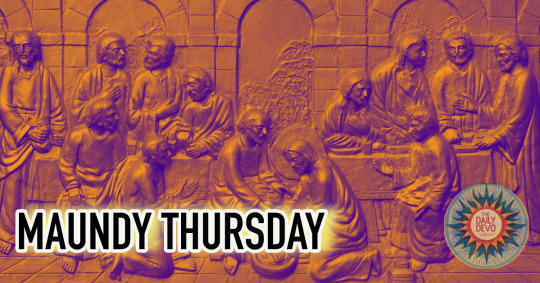
"When they were eating, he took a loaf of bread, and after blessing it he broke it, and gave it to them, and said, "Take this is my body." Then he took a cup and after giving thanks he gave it to them, and all of them drank from it. He said to them, "This is my blood of the covenant, which is poured out for many." - Mark 14:22-24
Today is Maundy Thursday. We call it "Maundy" Thursday because the ancient church mothers and fathers connected it to Jesus' "mandate" to his disciples on this day of Holy Week: "Love one another as I have loved you."
This is also the day we remember Jesus celebrating Passover with his closest friends--what Christians call "The Last Supper."
Jesus loved a good party. If you read through the Gospel accounts of Jesus' life, you will find that in every other chapter, he's sitting down to dinner with one group of people or another.
As he gathered with the twelve disciples on Thursday of Holy Week, Jesus did something that he'd done before when he miraculously fed five thousand-plus people on the hills above Galilee:
He took, blessed, broke, and gave.
When he fed the multitude, he took the food already there among the people, blessed it, broke it, and gave it. It was more than enough for everyone when it passed through his hands.
This miracle was a sign and a symbol of what the world should be like and will be like when God's shalom is fully realized on earth—when there is enough food, drink, hope, peace, and life for all.
Theologians Marcus Borg and Dominic Crossan see the connection between the feeding of the multitude and the beautiful moment when Jesus broke bread and shared the cup with his disciples on Maundy Thursday.
Like the feeding of the multitude, this new feast was enough for everyone... everywhere. "Jesus Last Supper," they assert, "was to be the First Supper of the future."
The bread... the wine... These are ordinary things that are given extraordinary meaning. The earthiness of the elements matters to Jesus because he wanted to constantly remind his followers that he embraced earthiness for their sake.
When those earthy elements passed through his hands—when he took, broke, blessed, and gave them —they became, through the faith of the outstretched hands who received them, his own earthiness, his own body.
Miraculously, mystically, and beautifully, we receive Jesus himself by faith in the moments we share that meal again—Jesus who was taken, broken, blessed, and given, Jesus who continually comes to us to provide us with life in abundance.
The ordinary elements do not lose their "ordinary-ness," which is the beauty of the whole thing. They serve as a sacrament, a way for us to know that we have received Christ, and carry Christ out into the world.
And Beloved, there is enough of Jesus for everyone... everywhere.
May the grace and peace of our Lord Jesus Christ be with you now and always. Amen.
#presbymusings#dailydevotion#leonbloder#dailydevo#dailydevotional#christian living#leon bloder#faith#spiritualgrowth#spirituality#holy week#maundythursday
0 notes
